| |
 |

|
| |
NECE NEWSLETTER 03 | 2021
Dear Collegues,
In the NECE Declaration, the year 2020 was declared a watershed moment for Citizenship Education in Europe. The pandemic and many other subsequent developments have confirmed this assessment. A lot has happened since. The Conference on the Future of Europe was launched in April this year and has received 3.5 million visitors to date on the digital platform, which is the heart of this project. The recently launched Competence Centre on Participatory and Deliberative Democracy builds on the idea of the CoFoE and aims to mainstream citizen engagement throughout Europe. It addresses all levels, from local to EU, seeking to create spaces and providing knowledge and best practices to support participation in the processes that lead to decision making. Another example is a study that was recently published within the framework of the EPRS (Implementation of citizenship education actions in the EU (EPRS_STU(2021)694207)). It contains the encouraging finding that Citizenship Education is becoming increasingly important for the EU and its member states, at least on paper, yet it also cautions that implementation is still lagging behind.
While these developments are positive, there is still a long way to go. Who would be better placed to set out on this path than the practitioners and experts in Citizenship Education? After all, it is they who can implement quality education in every respect. In numerous NECE Campus events so far, organizations from all over Europe have presented their innovative and creative projects. The grand finale will be the NECE 2021 conference on 28 and 29 October: “Committed to Change! Reimaging the Future of Citizenship Education in Europe”. During this hybrid event we will open our doors to practitioners and experts around the globe to discuss and learn with each other and to shape the future of Citizenship Education. We are needed more than ever, so register right here.
Best wishes and stay well!
Petra Grüne & Fatih Demircan (Federal Agency for Civic Education/bpb)
Anja Ostermann plus the NECE Team of labconcepts (Bonn/Berlin)
|
|
 |
| |
NEWS about NECE |
|
| |
INSIDES FROM NECE
NECE Conference 2021 – #digitalNECE: Committed to change! Reimagining the future of citizenship education in Europe.
 28 – 29 October 2021, Les Ateliers des Tanneurs, Brussels I Hybrid event
28 – 29 October 2021, Les Ateliers des Tanneurs, Brussels I Hybrid event
In Brussels, where EU decision-making is happening every day, we invite you to share skills, practice and knowledge from many different countries and backgrounds. On 28 and 29 October, we are hoping to connect once again to debate and discuss, to agree and disagree in the heart of European politics, at the NECE Conference 2021 in Brussels.
Bonaventure Soh Bejeng Ndikung, renowned artist, curator, art critic and author, will open the conference. We will link up with local organisations in the city of Brussels who will present themselves and offer field trips, among them the Federation for Global and Democratic Organisations, the Foyer, MAKS, and more!
This year's conference will focus on questions surrounding the future of citizenship, democracy and society, and the role of citizenship education. How can education provide for new forms of civic participation? How does citizenship education engage with the ever-growing digitization and sustainable development issues? With the current global challenges and transformations, old paradigms in politics, economy and society are becoming irrelevant. Social inequality in public life and power imbalances are gaining ground at regional, national and international levels. How can citizenship education set an agenda and prepare itself for the future, knowing that the next crisis will certainly come?
The conference programme includes both on-site and online workshops, satellite events, an open space, field trips to local organisations in the city of Brussels, and much more!
Participation in the conference is free of charge. Register here for the conference!
The NECE CAMPUS 2021 - #NECECAMPUS
For the second year in a row, the NECE CAMPUS 2021 provided a digital hub for citizenship education. From May till October, 20 digital workshops, presentations, a project market etc. with presenters from Bulgaria, France, the Netherlands, Uganda and many more created digital spaces for educators, experts in citizenship education, civil society actors and others. With this wide range of topics and backgrounds, the CAMPUS also created a community for the NECE Conference, set to take place in Brussels on 28 - 29 October 2021, and kept the community engaged over a longer period of time instead of a single event only. Find more information here.
INSIDES FROM NACE (Networking Arab Civic Education)
histoCON workshop in Algeria organized by NACE member Abdallah Khazene
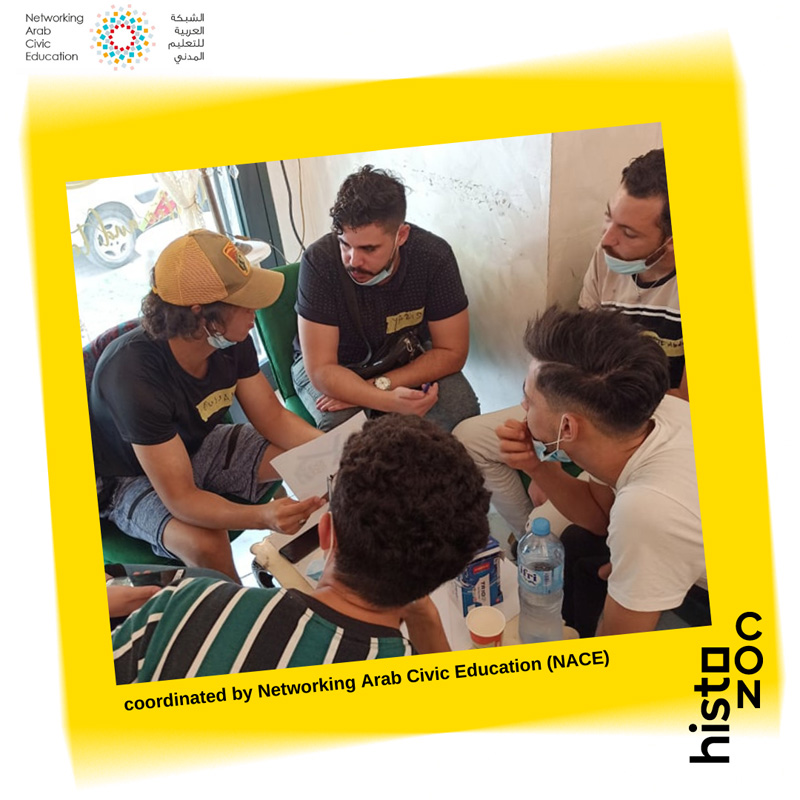 On September 23, NACE organized one of the first histoCON workshops 2021 "One date with two tales" in Algeria. A group of motivated and committed young people met in Aïn Témouchent to debate different historical topics and discuss questions like “How can we maintain a sustainable peace process in the world, and what can we do to maintain a sustainable peace process within our communities?” For more information about future NACE activities, check the NACE website and follow NACE on Facebook & Instagram.
On September 23, NACE organized one of the first histoCON workshops 2021 "One date with two tales" in Algeria. A group of motivated and committed young people met in Aïn Témouchent to debate different historical topics and discuss questions like “How can we maintain a sustainable peace process in the world, and what can we do to maintain a sustainable peace process within our communities?” For more information about future NACE activities, check the NACE website and follow NACE on Facebook & Instagram.
|
|
| | |
STUDIES ON DEMOCRACY AND THE EUROPEAN GREEN DEAL
| |  |
| |
No Green Deal without People‘s Zeal – A study by NECE Advisory Board member Verena Ringler
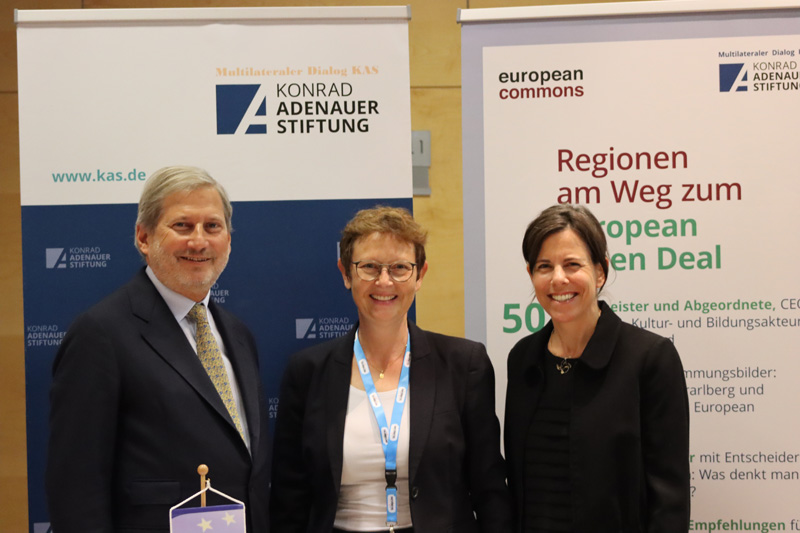 This is the gist of a new study on the opportunities and challenges presented by the European Green Deal (EGD) roadmap. Austria’s NECE Advisory Board member Verena Ringler, director of the European Commons Think & Do Tank, probed the questions and demands that 50 hand-picked CEOs, mayors, educators, architects and activists in three Austrian regions express regarding the EU’s green transition plan. Their key messages: the path to climate neutrality is a question of leadership and needs to be taken up by the C-suite of political, business, educational and social organisations. The participating regional shapers and rural pioneers encourage public sector budgeters to reform and scale people-to-people programmes and youth exchange structures in order to facilitate the technical aspects of decarbonization. Education and programmes for intercultural connection, skill sets for transformation, bottom-up innovation and inter-generational cooperation need a boost now, according to the study participants. Climate neutrality thus starts in seemingly far removed areas like education, children and youth work, and rural innovation, they say. Download the study report, published in German by European Commons and Konrad Adenauer Stiftung – Multilateraler Dialog, here. (Image: Copyright: European Commons)
This is the gist of a new study on the opportunities and challenges presented by the European Green Deal (EGD) roadmap. Austria’s NECE Advisory Board member Verena Ringler, director of the European Commons Think & Do Tank, probed the questions and demands that 50 hand-picked CEOs, mayors, educators, architects and activists in three Austrian regions express regarding the EU’s green transition plan. Their key messages: the path to climate neutrality is a question of leadership and needs to be taken up by the C-suite of political, business, educational and social organisations. The participating regional shapers and rural pioneers encourage public sector budgeters to reform and scale people-to-people programmes and youth exchange structures in order to facilitate the technical aspects of decarbonization. Education and programmes for intercultural connection, skill sets for transformation, bottom-up innovation and inter-generational cooperation need a boost now, according to the study participants. Climate neutrality thus starts in seemingly far removed areas like education, children and youth work, and rural innovation, they say. Download the study report, published in German by European Commons and Konrad Adenauer Stiftung – Multilateraler Dialog, here. (Image: Copyright: European Commons)
International study on the understanding of democracy
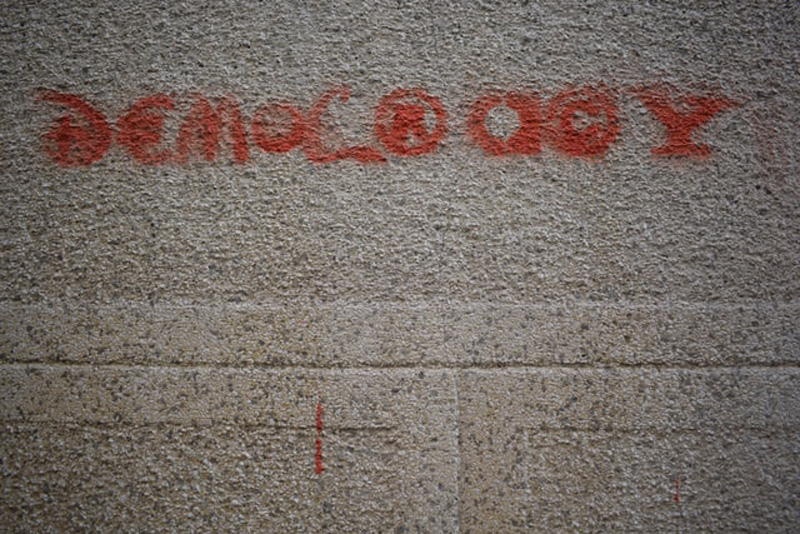 There is growing concern around the future of democracy. In addition to the political disenchantment that is found across most major Western democracies, more fundamental questions have recently arisen around trust in institutions and the democratic process itself. These doubts have been exacerbated by new social and political forces that, considered together, amount to a significant new challenge to democracy as a system of government.
There is growing concern around the future of democracy. In addition to the political disenchantment that is found across most major Western democracies, more fundamental questions have recently arisen around trust in institutions and the democratic process itself. These doubts have been exacerbated by new social and political forces that, considered together, amount to a significant new challenge to democracy as a system of government.
For civil society action to be effective in tackling the challenges of current democratic dynamics, a first step should be to gain a better understanding of what democracy currently means to people, what their expectations of the political system are, and how they experience democracy in their daily lives.
The Robert Bosch Stiftung and More in Common have joined forces to conduct a practice-oriented and cross-national study to investigate people's relationship to democracy. Since the beginning of 2021, they spoke to more than 10,000 people. Particular focus was placed on those segments of the population who are neither active supporters nor vocal critics of democracy but are furthest removed from the democracy debate. The result is the study “It’s Complicated. People and their democracy in Germany, France, Britain, Poland, and the United States”. An executive summary can be accessed here. (Image by Marija Zaric on Unsplash)
Study: “Democracy and the Rule of Law in the European Union”
This report examines not only how European citizens evaluate the state of democracy in their country and the EU more generally, but also what they think characterizes a good democracy. It addresses three questions regarding EU citizens’ perceptions in this regard: What are the most important characteristics of democracy? How well does democracy function in their own country and in the EU? To what extent do they trust their country’s government or the EU with regard to delivering an effective response to the COVID-19 pandemic? The report seeks to answer these questions by presenting evidence based on a survey conducted in December 2020 in which just under 12,000 citizens across the EU have been interviewed. View the whole report and its results here.
Book discussion: Democracy Rules by Jan-Werner Müller
How do we re-invigorate institutions essential for the success of democracy such as political parties and free media? Can we re-empower citizens while also preserving a place for experts? How can we ensure the future dynamism and creativity of democracies?
These are some of the urgent questions addressed in Jan-Werner Müller’s (Princeton University) much anticipated new book Democracy Rules. CEU Democracy Institute's Review of Democracy has hosted a discussion of the book with the author under the moderation of Zsolt Enyedi (Central European University) and with three prominent voices in the field: Gráinne de Búrca (New York University), Jan Kubik (Rutgers University and University College London), and Karolina Wigura (University of Warsaw). If you missed the discussion and are interested in watching, you can watch it again here. More information on the past event.
Timothy Snyder: How local journalism can reshape our democracy
For a democracy to work, citizens need to be engaged and informed beyond casting their vote in elections. At the DW (Deutsche Welle) Global Media Forum in June 2021, DW’s international and interdisciplinary conference on “Disruption and Innovation”, US historian and best-selling author Timothy Snyder gave a talk on disruptive democracies and the media. He emphasized how local journalism plays a crucial role in safeguarding the backbone of democracy. In a world that is oversaturated with information, he argues, citizens need journalism to return to the basic truths that are actually needed to guide our lives. He also says that media needs to work more at a local level. Here you can read more about why Snyder believes in the power of truth and local media to reshape our democracy.
| |
| | |
GOOD PRACTICE: IDEAS & EXAMPLES
| |  |
| |
Giving every young person a chance - Social mixing between schools: launch of the "Jumelage" project in France
In a period of health crisis that has reinforced inequalities and weakened social mixing, where pupils tend to withdraw into themselves and their usual circles, the eTwinning France office, in collaboration with the Make.org Foundation and with the support of PwC and the Fondation Société Générale, has developed the "Jumelage" programme.
The "Jumelage'" project is the result of a vast national consultation launched in 2018 "How to give every young person a chance?" and has been tested with the Académie de Versailles with more than 200 pupils. From 8 September 2021, teachers from all the Academies in France will be able to set up their own twinning projects, using eTwinning tools, especially via the eTwinning Live network.
The aim is to reach more than 5,000 beneficiary pupils per year and to link classes from different social and geographical backgrounds around educational projects on various themes: sustainable development, artistic and cultural education, democracy and citizenship, media and information literacy, gender equality, public speaking, eating well etc.
|
|
| |
EPALE Resource Kit - A dive into EPALE thematic focuses: Inclusive Social Change for Sustainability and Fairness
How to ensure the right to quality education to each and every individual? How can we reach out to vulnerable groups? How can we empower citizens to become actors of inclusive and sustainable change? The EPALE (Electronic Platform for Adult Learning in Europe by the European Commission) thematic focus on Inclusive Social Change for Sustainability and Fairness seeks to address these priorities, looking at how the Adult Learning community is responding to them with thoughts, research and concrete practices. Read more here.
|
|
| |
Lifelong learning in ageing societies: Lessons from Europe
The need to incorporate lifelong learning strategies across the EU has grown within our ageing societies. This paper is part of a collection that builds on the UIL (UNECSO Institute for Lifelong Learning) report Embracing a Culture of Lifelong Learning. It sets out the main challenges for lifelong learning in ageing societies and concludes that there is a growing need to promote lifelong learning in local and community settings and for all age groups.
|
|
| | |
EU PROGRAMMES AND EUROPEAN INITIATIVES
| |  |
| |
Study “Implementation of citizenship education actions in the EU” published by the European Parliamentary Research Service
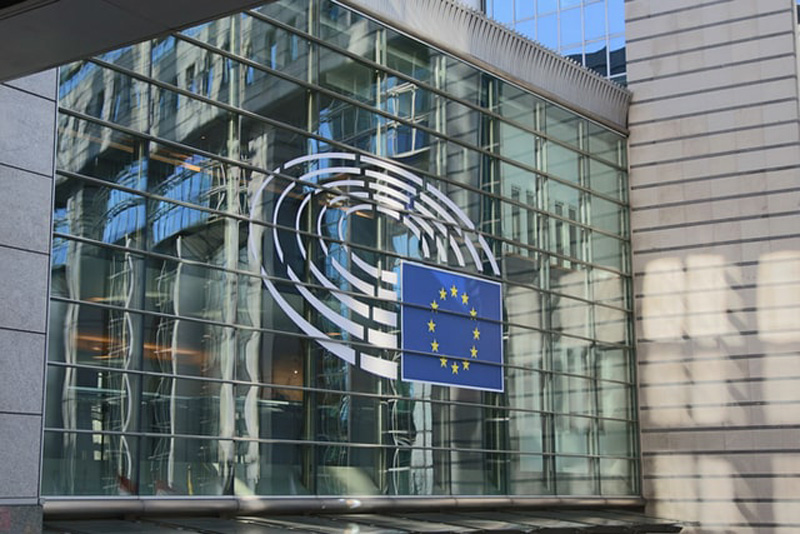 In December 2020, the European Parliament’s Committee on Culture and Education (CULT) requested an in-house report to be drawn up on the implementation of citizenship education actions (2021/2008(INI)). Domènec Ruiz Devesa (S&D, Spain) was appointed rapporteur. The European implementation assessment (EIA) has been prepared to accompany the CULT committee in its scrutiny work on the implementation of citizenship education actions in the European Union. The first part of the EIA presents an overview of the EU policy framework for citizenship education, while the second part presents actions in the field of citizenship education supported by EU funding programmes, in particular the Erasmus+ and Horizon 2020 programmes. The second part also presents citizenship education policies and practices in 10 EU Member States. Find the study here. (Image by Guillaume Périgois on Unsplash)
In December 2020, the European Parliament’s Committee on Culture and Education (CULT) requested an in-house report to be drawn up on the implementation of citizenship education actions (2021/2008(INI)). Domènec Ruiz Devesa (S&D, Spain) was appointed rapporteur. The European implementation assessment (EIA) has been prepared to accompany the CULT committee in its scrutiny work on the implementation of citizenship education actions in the European Union. The first part of the EIA presents an overview of the EU policy framework for citizenship education, while the second part presents actions in the field of citizenship education supported by EU funding programmes, in particular the Erasmus+ and Horizon 2020 programmes. The second part also presents citizenship education policies and practices in 10 EU Member States. Find the study here. (Image by Guillaume Périgois on Unsplash)
|
|
| |
Erasmus+ Programme: New format ‘Small-scale partnerships’ in Key Action 2
Small-scale partnerships open up new, simplified access to the programme. They are aimed at inexperienced and small local organisations that want to carry out their first project within the programme and build their first international partnerships, thus enabling peer learning. Small-scale partnerships help the organisations in their quality development and capacity building.
The possible combination of transnational and national activities (the latter with a European dimension) will enable active European citizenship and bring a wider European dimension to the local level. The possibility of including national activities should also facilitate the inclusion of people with fewer opportunities in the project's activities. Find more information and application details here.
| |
| |
EU Programme „Citizens, Equality, Rights and Values“ (CERV 2021-2027)
The German national contact point for the EU programme "Citizens, Equality, Rights and Values" (CERV 2021 - 2027) provides information about the programme topics and advises interested people on how to apply for the programme. Citizenship education is one of the cross-cutting themes and many of the funded projects are in the field of civic, cultural or historical education. Through the redesign of the programme in the new funding period, organised civil society has become an even stronger target group of the programme. The "Union Values" strand, which has the most funding, has more than 600 million euros available for European civil society. For more information see here.
| |
| |
Strengthening Democratic Culture in Basic Education
The European Union – Council of Europe Joint Project “Strengthening Democratic Culture in Basic Education” aims to integrate a democratic school culture that corresponds with universal core values as well as fundamental rights and freedoms into the Turkish national education system. The specific objectives of the project are:
strengthening democratic values and practices in schools and school communities, strengthening the capacity of stakeholders including policy makers, education administrators both at the Ministry of National Education and at provincial level, inspectors, school principals, teachers, parents, and local civil society organisations (CSO) on democratic school culture.
The launching event of the pilot implementation, which involves 110 schools throughout 10 pilot provinces of the EU/CoE Joint Project, took place on 28 September 2021 in Ankara. Starting in October, the implementation phase will serve to test the education materials and the whole school model.
| |
 | | |
CALLS
| |  |
| |
Call for country experts on education – Be part of the largest ever data collection project on education policies
Since its inception in 2014, the V-Dem Institute has developed, tested and standardised a world-leading, sophisticated data collection, curation, and aggregation method for expert-coded data. For more details about the V-Dem aggregation methodology, please click here. Together with the Varieties of Democracy (V-Dem) Project at the University of Gothenburg, the University of Glasgow will build a completely new database on education, to accumulate knowledge of more than 1,000 education experts and measure indicators of education policies and practices for all countries in the world. You are invited to participate in a new DEMED and V-Dem joint project as a Country Expert for the country (or countries) of your expertise. Be part of this global project and contribute your knowledge!
The online coding will take place between January and February 2022. More information and application here.
| |
 | | |
UPCOMING EVENTS
| |  |
| |
histoCON 2021
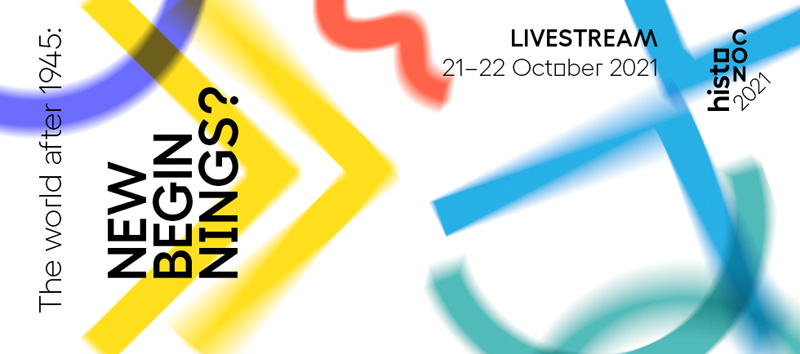 histoCON 2021 is an interactive, easy to access format with show elements which will be broadcasted live on 21 and 22 October 2021. During the three one-hour live shows, participants can engage in live surveys and social media. In addition, bpb partners around the world will organize “watch parties” for those interested in watching histoCON 2021 together. This makes histoCON 2021 a new digital and hybrid proposition which will also announce events that may take place on site in Berlin in 2022.
histoCON 2021 is an interactive, easy to access format with show elements which will be broadcasted live on 21 and 22 October 2021. During the three one-hour live shows, participants can engage in live surveys and social media. In addition, bpb partners around the world will organize “watch parties” for those interested in watching histoCON 2021 together. This makes histoCON 2021 a new digital and hybrid proposition which will also announce events that may take place on site in Berlin in 2022.
In 2021, under the title “The World After 1945: New Beginnings?”, bpb will be looking into the world after 1945 and global post-war history with experts, practitioners and artists. Together with young people from all around the world histoCON will explore three topics and discuss them from different angles:
Live show 1 – 21 October, 17:00 hrs CEST: “Our World Between Dependence & Independence”
Live show 2 – 22 October, 11:00 hrs CEST: “Our World Between Transformation & Continuity”
Live show 3 – 22 October, 17:00 hrs CEST: “Our World Between Conflict & Cooperation”
Live on YouTube, histocon.de and watch parties around the world
| |
| |
ECIT Foundation Annual Conference 2021 – Reclaiming European Citizenship (26 – 28 October 2021)
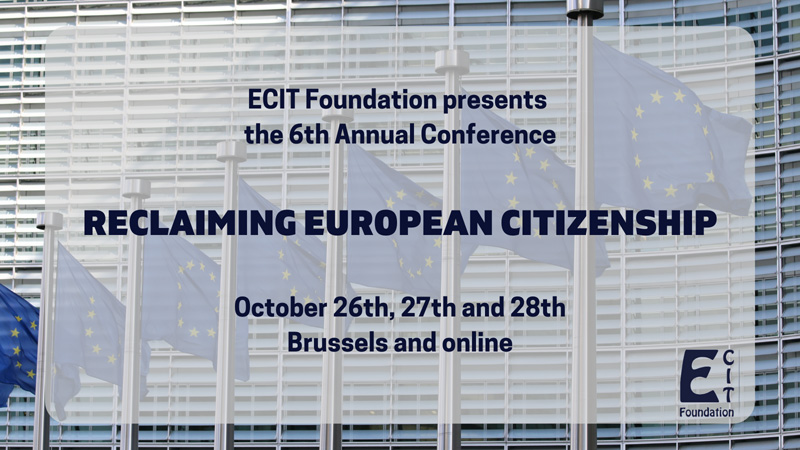 Like its predecessors, this sixth ECIT annual event will bring together civil society representatives, researchers and EU policy-makers across different areas of policy and organisational structures. The main threads running through the event will be the mid-term evaluation of CoFoE (Conference on the Future of Europe) and the proposed statute on European citizenship. European citizenship will be tackled as a holistic concept, focusing on rights, participation and belonging. The conference will attempt a deeper assessment of where this first transnational citizenship of the modern era stands after the COVID-19 pandemic. The conference is organised in close cooperation with NECE. Register now!
Like its predecessors, this sixth ECIT annual event will bring together civil society representatives, researchers and EU policy-makers across different areas of policy and organisational structures. The main threads running through the event will be the mid-term evaluation of CoFoE (Conference on the Future of Europe) and the proposed statute on European citizenship. European citizenship will be tackled as a holistic concept, focusing on rights, participation and belonging. The conference will attempt a deeper assessment of where this first transnational citizenship of the modern era stands after the COVID-19 pandemic. The conference is organised in close cooperation with NECE. Register now!
| |
| |
University:Future Festival
LLLP (Lifelong Learning Platform) partnered with the University:Future Festival - An inclusive debate! The event “University:Future Festival” will take place from 2 to 4 November 2021 under the motto “Open for Discussion”. Discover the format and sign up now!
| |
| |
UN Climate Change Conference UK 2021 in partnership with Italy
The UK will host the 26th UN Climate Change Conference of the Parties (COP26) in Glasgow on 31 October – 12 November 2021. The COP26 summit will bring together parties to accelerate action towards the goals of the Paris Agreement and the UN Framework Convention on Climate Change. The UK is committed to working with all countries and joining forces with civil society, companies and people on the frontline of climate change to inspire climate action ahead of COP26. Read more about the UK Presidency, the COP26 Goals and the Conference here.
| |
| |
Global Education Week 2021 (15 - 19 November 2021)
Global Education Week 2021 will take place in Germany under the motto "Making digital learning fair worldwide". The aim is to stimulate an exchange on what a digital transformation of education could look like in Germany, in Europe and worldwide. What needs to be done, in an era of digitization, to make high quality education a reality for all people as called for by the UN Agenda 2030? You can find more information on the topic and how to participate on the website of World University Service. In Germany, Global Education Week is coordinated by the Information Centre for the North-South Educational Mission at the World University Service e. V. (WUS) and is an initiative of the North-South Centre of the Council of Europe in Lisbon.
| |
| |
Unser Europa, unsere Zukunft! / Notre Europe, notre avenir! – A Franco-German project workshop (25 – 28 November 2021)
As part of the conference on the future of Europe, the Franco-German Youth Office (FGYO/DFJW/OFAJ) is inviting 120 young people from Germany and France to a project workshop on Europe, in order to exchange ideas and visions, get inspiration for new projects and receive professional support for their implementation. More information and registration here.
| |
| |
LLLWeek 2021 (29 November – 3 December 2021)
The 11th edition of the Lifelong Learning Week will take place in a hybrid format in the week starting 29 November. Save the date in your calendar! This year, it will be based on the theme “The changing nature of evaluation in education and its impact on learners’ wellbeing”. During LLLWeek, European civil society organisations will be bringing their burning issues, priorities and (crucially) solutions to EU decision-makers, to try and make our education systems more inclusive and more human.
| |
| |
Please note: Any links provided are for information and discussion only. The views
expressed are not necessarily shared by NECE as a networking platform.
| |

|
| |
WANTED: Your Contribution to the NECE Newsletter!
|
|
 |
| |
Are you involved in citizenship education in Europe or North Africa? Are you running projects aimed at promoting democratic values and tolerance in your country or region? Do you think NECE (and the readers of this Newsletter) should know about your project and do you want to enlist their support/advice? We’d love to hear from you! Send your contributions, ideas, comments, and questions to: nece-newsletter@labconcepts.de or share your stories and projects via Social Media using our Hashtag #digitalNECE.
|
|
 |
| |
|
|
 |
| |
You are receiving the NECE Newsletter because you subscribed and have confirmed that you wish to receive information about the NECE-Networking European Citizenship Education initiative. To unsubscribe please click here.
The NECE Newsletter is published regularly and distributed via e-mail. The NECE Newsletter is published regularly and distributed via e-mail. It is available to anyone on www.bpb.de/veranstaltungen/netzwerke/nece/. The newsletter is published by the Bundeszentrale für politische Bildung (Federal Agency for Civic Education), which is responsible for its content according to definitions laid down by the German Telemedia Act.
Further contact information:
Federal Agency for Civic Education
Adenauerallee 86
53113 Bonn (Germany)
www.nece.eu
Responsible for the content:
Petra Grüne
petra.gruene@bpb.de
Editorial support:
Sarah Bühring & Susanne Pöschko
nece-newsletter@labconcepts.de
If you have any questions please e-mail to: nece-newsletter@labconcepts.de
|
|
 |
|

 In December 2020, the European Parliament’s Committee on Culture and Education (CULT) requested an in-house report to be drawn up on the implementation of citizenship education actions (2021/2008(INI)). Domènec Ruiz Devesa (S&D, Spain) was appointed rapporteur. The European implementation assessment (EIA) has been prepared to accompany the CULT committee in its scrutiny work on the implementation of citizenship education actions in the European Union. The first part of the EIA presents an overview of the EU policy framework for citizenship education, while the second part presents actions in the field of citizenship education supported by EU funding programmes, in particular the Erasmus+ and Horizon 2020 programmes. The second part also presents citizenship education policies and practices in 10 EU Member States. Find the study here. (Image by Guillaume Périgois on Unsplash)
In December 2020, the European Parliament’s Committee on Culture and Education (CULT) requested an in-house report to be drawn up on the implementation of citizenship education actions (2021/2008(INI)). Domènec Ruiz Devesa (S&D, Spain) was appointed rapporteur. The European implementation assessment (EIA) has been prepared to accompany the CULT committee in its scrutiny work on the implementation of citizenship education actions in the European Union. The first part of the EIA presents an overview of the EU policy framework for citizenship education, while the second part presents actions in the field of citizenship education supported by EU funding programmes, in particular the Erasmus+ and Horizon 2020 programmes. The second part also presents citizenship education policies and practices in 10 EU Member States. Find the study here. (Image by Guillaume Périgois on Unsplash) histoCON 2021 is an interactive, easy to access format with show elements which will be broadcasted live on 21 and 22 October 2021. During the three one-hour live shows, participants can engage in live surveys and social media. In addition, bpb partners around the world will organize “watch parties” for those interested in watching histoCON 2021 together. This makes histoCON 2021 a new digital and hybrid proposition which will also announce events that may take place on site in Berlin in 2022.
histoCON 2021 is an interactive, easy to access format with show elements which will be broadcasted live on 21 and 22 October 2021. During the three one-hour live shows, participants can engage in live surveys and social media. In addition, bpb partners around the world will organize “watch parties” for those interested in watching histoCON 2021 together. This makes histoCON 2021 a new digital and hybrid proposition which will also announce events that may take place on site in Berlin in 2022. Like its predecessors, this sixth ECIT annual event will bring together civil society representatives, researchers and EU policy-makers across different areas of policy and organisational structures. The main threads running through the event will be the mid-term evaluation of CoFoE (Conference on the Future of Europe) and the proposed statute on European citizenship. European citizenship will be tackled as a holistic concept, focusing on rights, participation and belonging. The conference will attempt a deeper assessment of where this first transnational citizenship of the modern era stands after the COVID-19 pandemic. The conference is organised in close cooperation with NECE. Register now!
Like its predecessors, this sixth ECIT annual event will bring together civil society representatives, researchers and EU policy-makers across different areas of policy and organisational structures. The main threads running through the event will be the mid-term evaluation of CoFoE (Conference on the Future of Europe) and the proposed statute on European citizenship. European citizenship will be tackled as a holistic concept, focusing on rights, participation and belonging. The conference will attempt a deeper assessment of where this first transnational citizenship of the modern era stands after the COVID-19 pandemic. The conference is organised in close cooperation with NECE. Register now!
 28 – 29 October 2021, Les Ateliers des Tanneurs, Brussels I Hybrid event
28 – 29 October 2021, Les Ateliers des Tanneurs, Brussels I Hybrid event On September 23, NACE organized one of the first histoCON workshops 2021 "One date with two tales" in Algeria. A group of motivated and committed young people met in Aïn Témouchent to debate different historical topics and discuss questions like “How can we maintain a sustainable peace process in the world, and what can we do to maintain a sustainable peace process within our communities?” For more information about future NACE activities, check the
On September 23, NACE organized one of the first histoCON workshops 2021 "One date with two tales" in Algeria. A group of motivated and committed young people met in Aïn Témouchent to debate different historical topics and discuss questions like “How can we maintain a sustainable peace process in the world, and what can we do to maintain a sustainable peace process within our communities?” For more information about future NACE activities, check the  This is the gist of a new study on the opportunities and challenges presented by the European Green Deal (EGD) roadmap. Austria’s NECE Advisory Board member Verena Ringler, director of the European Commons Think & Do Tank, probed the questions and demands that 50 hand-picked CEOs, mayors, educators, architects and activists in three Austrian regions express regarding the EU’s green transition plan. Their key messages: the path to climate neutrality is a question of leadership and needs to be taken up by the C-suite of political, business, educational and social organisations. The participating regional shapers and rural pioneers encourage public sector budgeters to reform and scale people-to-people programmes and youth exchange structures in order to facilitate the technical aspects of decarbonization. Education and programmes for intercultural connection, skill sets for transformation, bottom-up innovation and inter-generational cooperation need a boost now, according to the study participants. Climate neutrality thus starts in seemingly far removed areas like education, children and youth work, and rural innovation, they say. Download the study report, published in German by European Commons and Konrad Adenauer Stiftung – Multilateraler Dialog,
This is the gist of a new study on the opportunities and challenges presented by the European Green Deal (EGD) roadmap. Austria’s NECE Advisory Board member Verena Ringler, director of the European Commons Think & Do Tank, probed the questions and demands that 50 hand-picked CEOs, mayors, educators, architects and activists in three Austrian regions express regarding the EU’s green transition plan. Their key messages: the path to climate neutrality is a question of leadership and needs to be taken up by the C-suite of political, business, educational and social organisations. The participating regional shapers and rural pioneers encourage public sector budgeters to reform and scale people-to-people programmes and youth exchange structures in order to facilitate the technical aspects of decarbonization. Education and programmes for intercultural connection, skill sets for transformation, bottom-up innovation and inter-generational cooperation need a boost now, according to the study participants. Climate neutrality thus starts in seemingly far removed areas like education, children and youth work, and rural innovation, they say. Download the study report, published in German by European Commons and Konrad Adenauer Stiftung – Multilateraler Dialog,  There is growing concern around the future of democracy. In addition to the political disenchantment that is found across most major Western democracies, more fundamental questions have recently arisen around trust in institutions and the democratic process itself. These doubts have been exacerbated by new social and political forces that, considered together, amount to a significant new challenge to democracy as a system of government.
There is growing concern around the future of democracy. In addition to the political disenchantment that is found across most major Western democracies, more fundamental questions have recently arisen around trust in institutions and the democratic process itself. These doubts have been exacerbated by new social and political forces that, considered together, amount to a significant new challenge to democracy as a system of government.